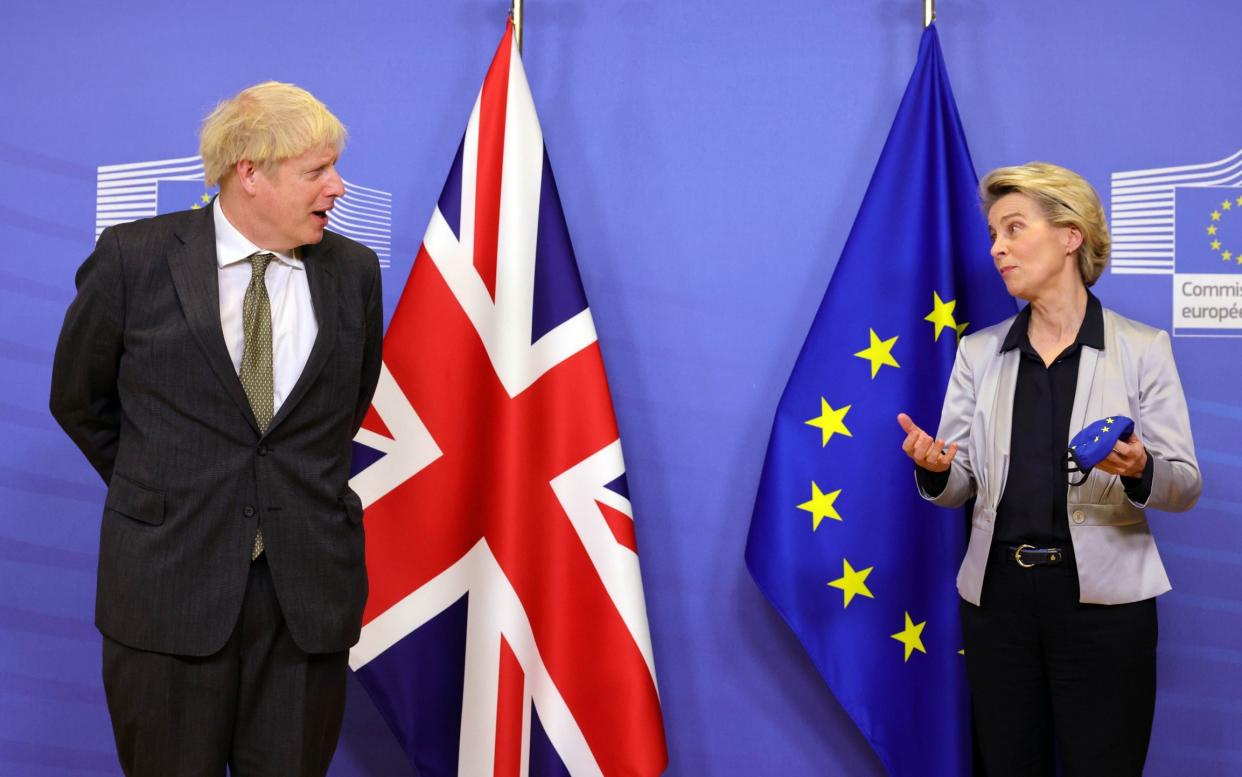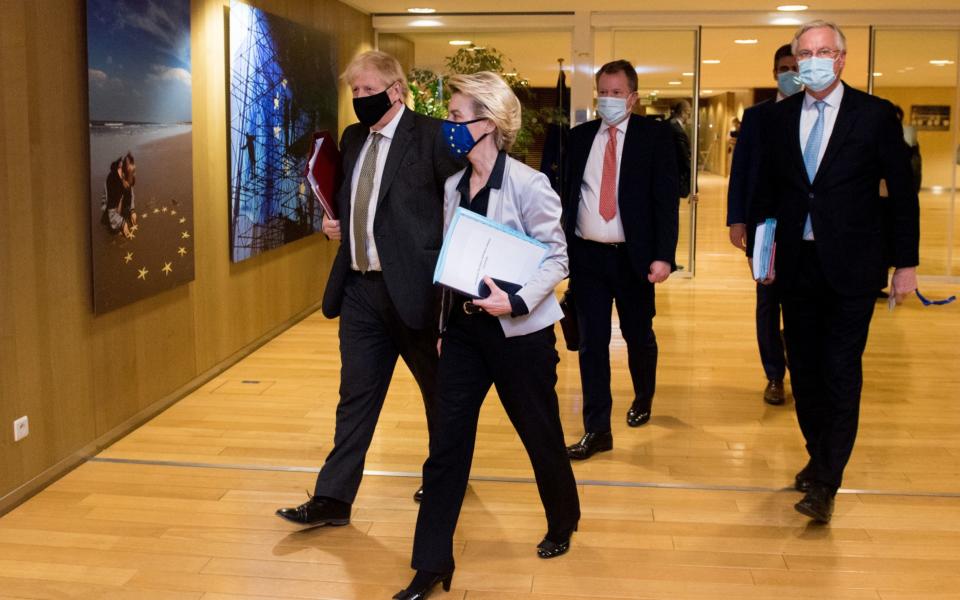Four days to avoid no deal after Brexit trade talks in Brussels fail to bridge 'large gaps'

Boris Johnson has given Brexit negotiators until this Sunday to avoid a no-deal after a meeting with the European Commission president failed to bridge “very large gaps” between the two sides.
The Prime Minister said he did not want to “leave any route to a possible deal untested” but was downbeat about the chances of an agreement after his three-hour dinner with Ursula von der Leyen in Brussels.
During their meeting Mr Johnson and Mrs von der Leyen had “a frank discussion about the significant obstacles which remain”.
Mrs von der Leyen described the talks as “lively and interesting” and enabled the two sides to “gain a clear understanding of each other’s positions” which “remain far apart”.
Sources close to the talks said there had not been any breakthroughs, and that while Mr Johnson had not “lost hope” of a deal “maybe that chance is diminishing”.
A senior Downing Street source said: “Very large gaps remain between the two sides and it is still unclear whether these can be bridged.
“The PM and Mrs von der Leyen agreed to further discussions over the next few days between their negotiating teams. The PM does not want to leave any route to a possible deal untested.
"The PM and Mrs von der Leyen agreed that by Sunday a firm decision should be taken about the future of the talks.”
Downing Street sources said that Sunday was now seen as a hard deadline for a decision on whether a deal can be reached, and that talks will only carry on beyond then if the “shape” of a deal has been agreed and “there are only details to clear up”.
Emmanuel Macron will snub any imminent request for a one-to-one discussion with Mr Johnson about Brexit despite France holding the keys to unlock a trade deal.
The French president has threatened to veto a deal after taking the hardest line of any EU leader on fishing quotas and access to the single market.
As EU leaders gather in Brussels on Thursday for a meeting of the European Council, there had been speculation that Mr Johnson could appeal directly to Mr Macron to help get a deal over the line.
Those hopes proved to be groundless as Mr Macron made clear that Britain could only speak to the EU’s chief negotiator, Michel Barnier, or Mrs von der Leyen.
One French official said it was “not desirable” for Mr Johnson to talk to Mr Macron and that France has “trust” in Mr Barnier as the EU’s representative in the negotiations.
The three obstacles preventing a deal are the issues of access to British fishing waters, Britain’s right to diverge from EU rules and regulations in the future, and the dispute mechanism that would govern any future complaints from either side about potential breaches of an agreement.
There is scepticism on both sides of the Channel as to whether the parties believe a deal is possible, or might simply allow the negotiations to play out because neither side wants to take the blame for forcing a no-deal outcome.
With just 22 days to go until the end of the transition period, a continuation of negotiations beyond Sunday would mean Parliament could be forced to sit between Christmas and New Year to ratify any deal before Britain leaves the single market by default on Jan 1.
Diplomatic sources raised the possibility of the Brexit negotiations continuing through the Christmas period. One senior EU diplomat said: “Miracles usually happen later this month.”
Speaker Sir Lindsay Hoyle said the House of Commons could sit as late as Christmas Eve should it be required to pass a Brexit bill.
Under current plans, the Commons will stop sitting on December 21, but he told Sky News recess could be delayed.
"If needs be, the House is the servant and I am happy as being that servant to ensure we can run, as far as I'm concerned, even up to Christmas Eve," he said.
Lord Frost, the UK’s negotiator, and Mr Barnier, the EU negotiator, joined Mr Johnson and Mrs von der Leyen at Wednesday night’s dinner and will be ready to resume talks in Brussels on Thursday.

Mr Johnson had earlier told MPs that “a good deal is still there to be done” but that “no prime minister” could sign up to the one on the table.
He said: “Our friends in the EU are currently insisting that if they pass a new law in the future with which we in this country do not comply or don’t follow suit, then they want the automatic right to punish us and to retaliate.
“Secondly, they are saying that the UK should be the only country in the world not to have sovereign control over its fishing waters.
“I don’t believe that those are terms that any prime minister of this country should accept.”
He insisted that the UK would “prosper mightily” with or without a deal.
EU leaders will meet on Thursday in Brussels for a scheduled session of the European Council, with France insisting that it will not become a platform for Mr Johnson to lobby directly other European leaders.
Even if a political breakthrough on the three critical issues of fishing, the level playing field guarantees and the deal’s enforcement is made, talks will have to continue to hammer out the technical details, sources said.
Mr Johnson arrived for the dinner at 7pm UK time. Mrs von der Leyen, wearing an EU flag mask, told the Prime Minister to “keep his distance” as she greeted him because of Covid rules. “You run a tight ship Ursula and quite right, too,” Mr Johnson replied. Ushering him inside, she said: “Allons-y”.
The Prime Minister was, somewhat inevitably, served a fish supper by Mrs von der Leyen, dining on scallops and turbot as the pair discussed fishing quotas and access to British waters.

